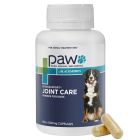
Dog Joint Supplements - do dog joint supplements work, and should I be giving joint supplements to my dog?
Modern veterinary medicine and science means our dogs generally live longer. However, older dogs mean older dog problems, and a very common problem for older dogs is joint stiffness and even osteoarthritis (sometimes shortened to OA, and also called Degenerative Joint Disease or DJD). It is estimated that 1 in 5 dogs will develop osteoarthritis in their life.
What can you do firstly, to minimise the chance of your dog developing osteoarthritis, and secondly, to lessen the impact of joint stiffness for your dog? The answer is dog joint supplements, and the team at www.DrCarl.com.au have a great range of dog joint supplements to help you and your dog!.
What is osteoarthritis?
When a dog has healthy joints, cartilage acts as a cushion, meaning the joint moves easily, smoothly and without causing pain. Age, “wear & tear”, disease, injury or obesity can cause the cartilage to break down, and this means that the movement of the joint is inflamed, without the cushioning cartilage. This condition is called Canine Osteoarthritis.
Because our dogs are better at hiding their pain, you don’t always notice the first signs of osteoarthritis in your dog. Here’s some warning signs of osteoarthritis:
- Stiffness, lameness, limping, or difficulty getting up
- Lethargy, or reluctance to run, jump, or play
- Weight gain
- Pain when petted or touched
- Irritability or changes in behavior
- Difficulty posturing to urinate or defecate, or having accidents in the house
- Loss of muscle mass over the limbs and spine
Discuss any of these changes with your vet, who will make recommendations about the best treatment for your dog, including joint health supplements that will help and will prevent further damage .
How do joint health supplements help my dog?
There is a large range of canine joint health supplements on the market - some of the best products include ingredients like:
- Epiitalis, a plant oil extract which builds chondrocyte cells for cartilage regeneration (found in 4Cyte).
- Glucosamin (found in Pernaease Powder),
- Chondroitin (found in PAW Cosequin DS and Sasha’s Blend),
- green lipped mussel (found in PAW OsteoSupport) and Glyde chews and powder)
- MSM (Methylsulfonylmethane) (found in PAW OsteoCare and Joint Guard chews and powder)
- omega-3 fatty acids (found in Sasha’s Flexibites and PAW Osteosupport)
These ingredients act to:
- Reduce inflammation and swelling in the joints, and so reduce pain
- Ensure cartilage is able to adequately absorb shock
- Nourish the connective tissues of joints
- Stimulate the growth of new cartilage; and
- Restore damaged cartilage
You can read more about how the different ingredients each work for your dog, and which products include these ingredients in our blog article “Do Dog Joint Supplements Really Work?”
When should my dog start using joint health supplements?
Joint health supplements are best given BEFORE your dog has noticeable joint problems - this is a problem that is far easier to address with a prevention rather than as a cure! Don’t wait until your dog is showing signs of pain to start him on joint health supplements!
Ideally, your dog should start using joint health supplements when they stop growing - once a dog’s growth stops, the amount of glucosamine that is produced naturally by a dog’s body starts decreasing. If your dog is a breed that is particularly prone to joint disease - bulldogs, German shepherds, shih tzus and labradors, to name a few - then you will want to start protecting their joints from as early as 12 months old.
What else can I do to help protect my dog’s joint health?
Here are some other handy tips to protect your dog’s joint health, in addition to dog joint supplements:
- If your dog has already developed osteoarthritis, your vet can prescribe medication to reduce pain and improve your pet’s quality of life! If prescription medication is needed, our sister site www.Petscripts.com.au can fill your dog’s prescription for these medicines (dispensed by Australian pharmacists at discounted prices)
- Make sure that your dog is at a healthy weight - obesity places extra strain on those joints! If Fido needs to lose a bit of padding around the tummy, he’s sure to love one of the great weight control pet foods like Eukanuba Weight Control food or Hill’s Science Diet Perfect Weight or Light ranges
- Keep your dog fit, with regular exercise. If your dog is already suffering joint health problems, consider (and let your dog guide you!) how far to walk, what type of surfaces are best for your arthritic dog, and specific movements that may cause pain.

